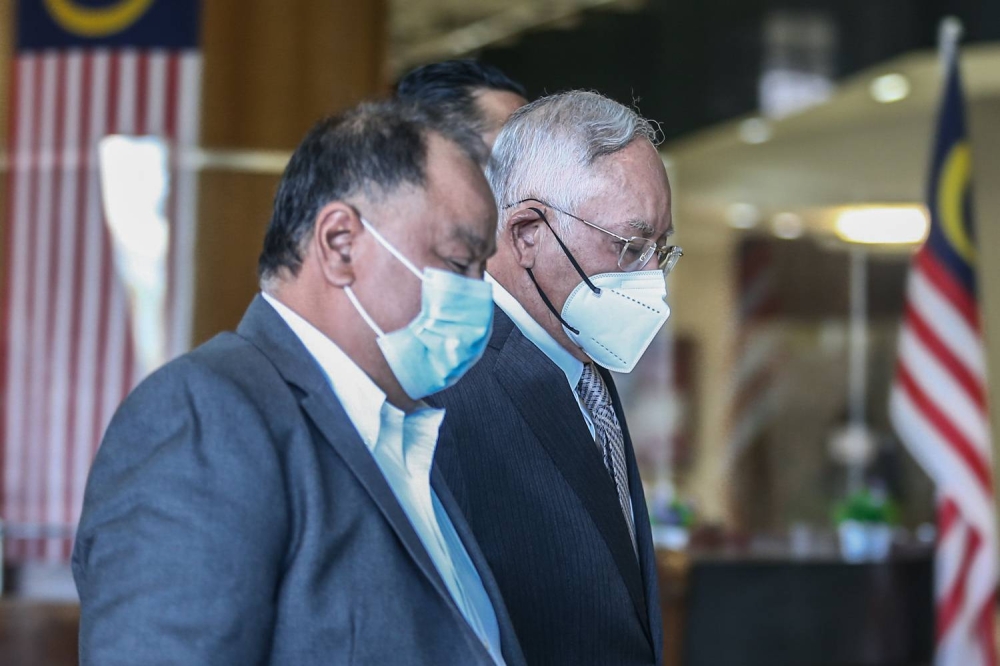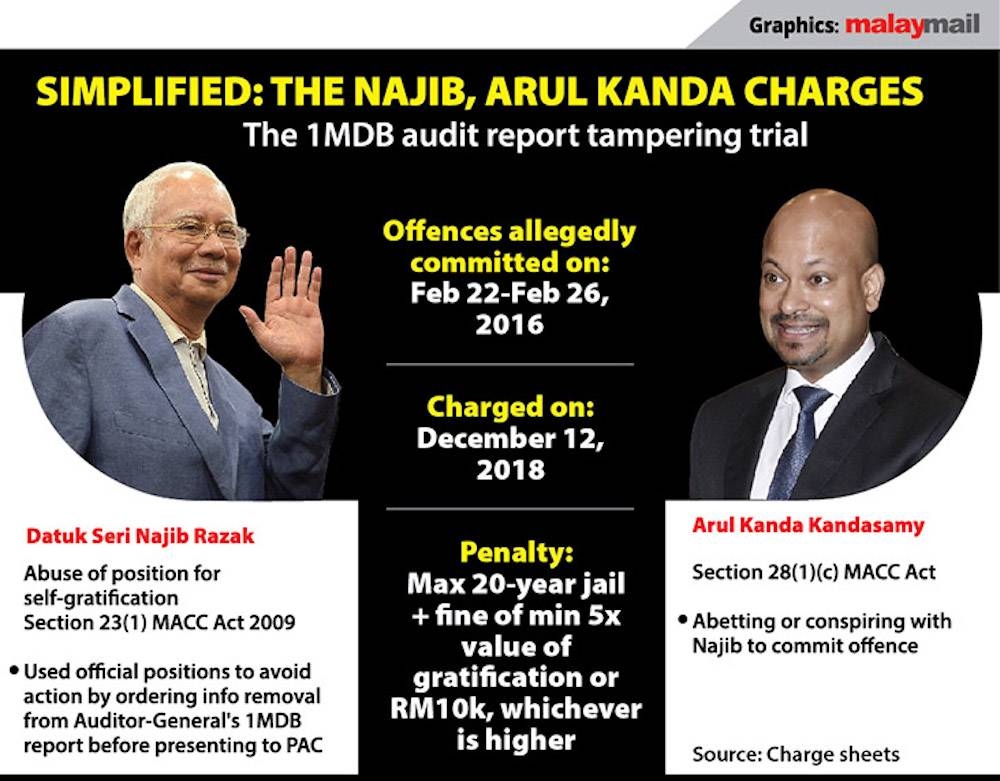KUALA LUMPUR, June 14 — Former 1Malaysia Development Berhad (1MDB) CEO Arul Kanda Kandasamy would “happily agree” to the prosecution’s application for him to testify as its witness against former prime minister Datuk Seri Najib Razak in a corruption trial here, his lawyer said today.
Arul Kanda’s lawyer, Datuk N. Sivananthan, informed the High Court that his client — who is currently also an accused person in the same trial as Najib — was prepared to stand by his previous statement to the Malaysian Anti-Corruption Commission (MACC) during investigations for this case.
High Court judge Mohamed Zaini Mazlan was asking whether Arul Kanda was agreeable to the prosecution’s application to have him appear as a witness.
“The position my client is taking, he has given his statement to the MACC when he was investigated, his position has always been and is now he's prepared to take the position that that statement he's given the prosecution, he's prepared to stand by those statement, if that is what the prosecution wants, he would happily agree,” Sivananthan replied.
The judge then remarked, “So, in English, it means yes”.
Mohamed Zaini went on to confirm that Arul Kanda agreed to be a prosecution witness.
The High Court will decide on June 24 whether to allow the prosecution’s application to call in Arul Kanda as a prosecution witness in this trial, after having heard arguments from the prosecution and also Najib’s lead defence lawyer Tan Sri Muhammad Shafee Abdullah.
On May 20, the prosecution filed its written application under Section 63 of the MACC Act 2009 to call Arul Kanda in as a witness.
Under Section 63(1), in a situation where two or more people are charged with an offence under the MACC Act, the court may require one or more of them to give evidence as witnesses for the prosecution if a written application is made by the public prosecutor.
Section 63(3) provides that every person accused under the MACC Act and required to give evidence as prosecution witness “shall be entitled to receive a certificate of indemnity”, if the court finds that he has made a “true and full discovery” of all things to which he was examined on, with this certificate to be a bar to all legal proceedings against him over such matters.
In other words, Arul Kanda could be acquitted and discharged if he testifies as a prosecution witness and if the High Court decides to give him a certificate of indemnity.
In this trial, Najib is accused of having as then prime minister and then finance minister abused his position between February 22, 2016 and February 26, 2016 to receive self-gratification in the form of protection from civil or criminal action over his role in the handling of 1MDB operations, by instructing for amendments to the auditor-general’s report on 1MDB — which was already finalised and ready to be presented to the parliamentary watchdog Public Accounts Committee (PAC) — before it was finally presented to the PAC.
Arul Kanda was charged with abetting Najib, but the prosecution had on the first day of trial already said it would file an application in the future to have Arul Kanda be a prosecution witness at an appropriate stage of the trial.

What the lawyers argued today
Earlier, Shafee objected to Arul Kanda being called as a prosecution witness, claiming the prosecution’s application was filed incorrectly as it should have come in the form of a notice of motion supported with an affidavit.
Shafee also argued that allowing Arul Kanda to be a prosecution witness would affect Najib’s right to a fair trial.
The lawyer accused the prosecution of acting in an “oppressive” way by letting Arul Kanda sit in the accused’s dock with Najib and listen to all previous prosecution witnesses, unlike ordinary witnesses who would not be allowed to be in court to hear what others said.
He also argued the prospect of indemnity in return for his testimony may lead to doubt over Arul Kanda’s truthfulness, suggesting the latter would essentially be coached in his testimony.
“So, in a way, he’s schooled into saying and parroting the same thing that he had told the MACC, that by itself strikes at the very core of the right to a fair trial system,” he claimed, further insisting that the prosecution should have listed in detail what Arul Kanda had discussed with Najib in the past and why it would be useful for this trial.
Lead prosecutor Datuk Seri Gopal Sri Ram argued, however, that the application was done correctly as Section 63 only required that the application be made in writing, which he said was the case.
Sri Ram also said there are sufficient safeguards to ensure a fair trial, as Arul Kanda must satisfy the test of credibility just like other witnesses, and his evidence must be corroborated, and the High Court judge has a duty to warn himself to treat Arul Kanda’s evidence with even greater caution as he would be naturally inclined to minimise his own involvement in his evidence.
Sri Ram also highlighted the relevance of Arul Kanda’s evidence to this trial as an alleged abettor to Najib, pointing out that he was the 1MDB CEO at that time and had attended meetings on February 24 and February 25 in 2016 while Najib was 1MDB’s board of advisers’ chairman.
“How he came to attend the meetings and any communication he had with the accused are matters to which he is privy. He is also privy to all relevant conversations he may have had with the accused Najib concerning the charge against the latter,” he said, also arguing that Arul Kanda’s evidence would be relevant to show corrupt intent to prove the case against Najib.
Asked about hypothetical situations by the judge, Sri Ram suggested that a granting of the certificate of indemnity would result in the court giving an acquittal to Arul Kanda, and that it would be safest to charge Arul Kanda in a separate trial in another court if no certificate of indemnity is granted to avoid complaints of unfair trial by Arul Kanda.
Sivananthan today also raised various practical considerations for the court to weigh if Arul Kanda were to be called in as a prosecution witness, such as at what stage the court would decide whether to give a certificate of indemnity.
Sivananthan also raised questions such as whether Arul Kanda would have to go back to the accused’s dock after testifying if he can no longer be an accused person in this trial, also highlighting that he would not be able to cross-examine other prosecution witnesses if Arul Kanda is no longer an accused and if the judge will only decide whether to grant indemnity at the end of testimony of other prosecution witnesses.
Having heard all lawyers, the judge indicated that the practical aspects may have to be considered or decided as and when needed, and that his decision at the next court date would be on whether to allow Arul Kanda to be called in as a prosecution witness.
Deputy public prosecutor Ahmad Akram Gharib confirmed to the court that the trial will be proceeding with Arul Kanda as the next prosecution witness if he is allowed to be called in, and that the prosecution would be ready to continue with the investigating officer of this case as the next prosecution witness if the court dismisses the application to have Arul Kanda testify.
The trial is nearing the end of the prosecution’s case, as the investigating officer is expected to be the final prosecution witness.























